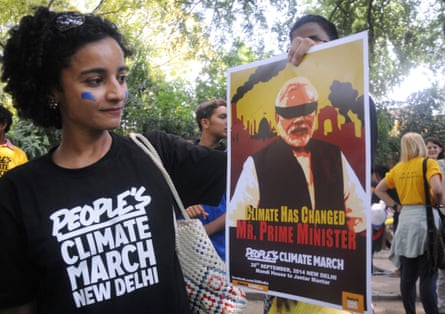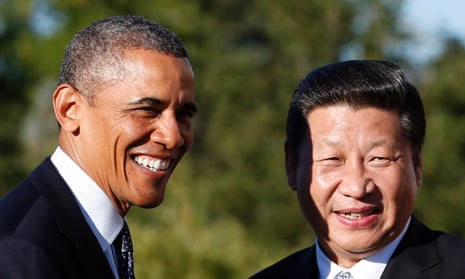The United States and China sprang a surprise last week with their secretly-negotiated deal to reduce their greenhouse gas emissions. Although cheered as “historic milestone in the global fight against climate change,” “the real deal,” a “landmark,” “ambitious,” and “game-changer” by western media, the agreement received a less than enthusiastic response in India.
The Centre for Science and Environment (CSE), a research and advocacy NGO based in Delhi, called it a “self-serving and business-as-usual” deal and complained it was neither historic nor ambitious. The US and China had set targets that would cause a catastrophic 4C rise in global temperature, much higher than the 2C target set by the Intergovernmental Panel on Climate Change (IPCC).
Prakash Javadekar, the minister for environment, forests and climate change, called the deal “not so ambitious” but welcomed it as a “good beginning.”
Last month, the EU agreed to cut its greenhouse gas emissions by at least 40% below 1990 levels by 2030. The US, however, has agreed to 26 to 28% reduction below 2005 levels by 2025. That’s only 15-17% below 1990 levels, less than half of EU’s commitment, said CSE. To meet the IPCC-set target, the US needs to cut at least 50-60% below 1990 levels.
The US-China pact may not save the planet, but at least the world’s top two polluters have made a commitment, however modest it may be.
Now that China, US and the EU have announced the cuts they intend to make, it appears to be India’s turn. The UK’s parliamentary under secretary of state for energy and climate change, Baroness Verma urged India to play a bigger role on climate change issues.

However, Chandra Bhushan, the deputy director of CSE said: if “India were to follow the principles of this deal, then we need not do anything till 2040 and beyond. Our per capita emissions in 2030 will be less than 4 tonnes CO2e [carbon dioxide equivalent] compared to 12 tonnes of the US and China.”
Even if the US-China deal doesn’t force India to be proactive, it will certainly force it to reassess its choices. India has long allied itself with China at climate change negotiations, and the latter’s bilateral agreement with the US must have come as a shock.
T. Jayaraman, a senior climate change analyst at the Tata Institute of Social Sciences, Mumbai, told The Telegraph, “There is a lesson for India here. If we don’t [pay heed], we will be hung out to dry very soon — we’d always mistakenly assumed that China’s negotiating position would remain fixed and in line with India’s.”
A few days before the deal was announced, a prescient Suresh Prabhu, prime minister Modi’s aide for the G20 meeting in Brisbane, Australia, said India’s alignment with China in climate change negotiations was a tactical error that had hurt the country’s interests. Javadekar dismissed Prabhu’s diagnosis as his personal opinion.
In the wake of the deal, how will India react? What percentage of emissions will the country pledge to cut and from when? There was some anticipation that India would reveal its cards at the recently concluded G20 summit in Brisbane, Australia. Perhaps India will reveal its commitment at the climate change summit in Lima, Peru, next month.

Comments (…)
Sign in or create your Guardian account to join the discussion